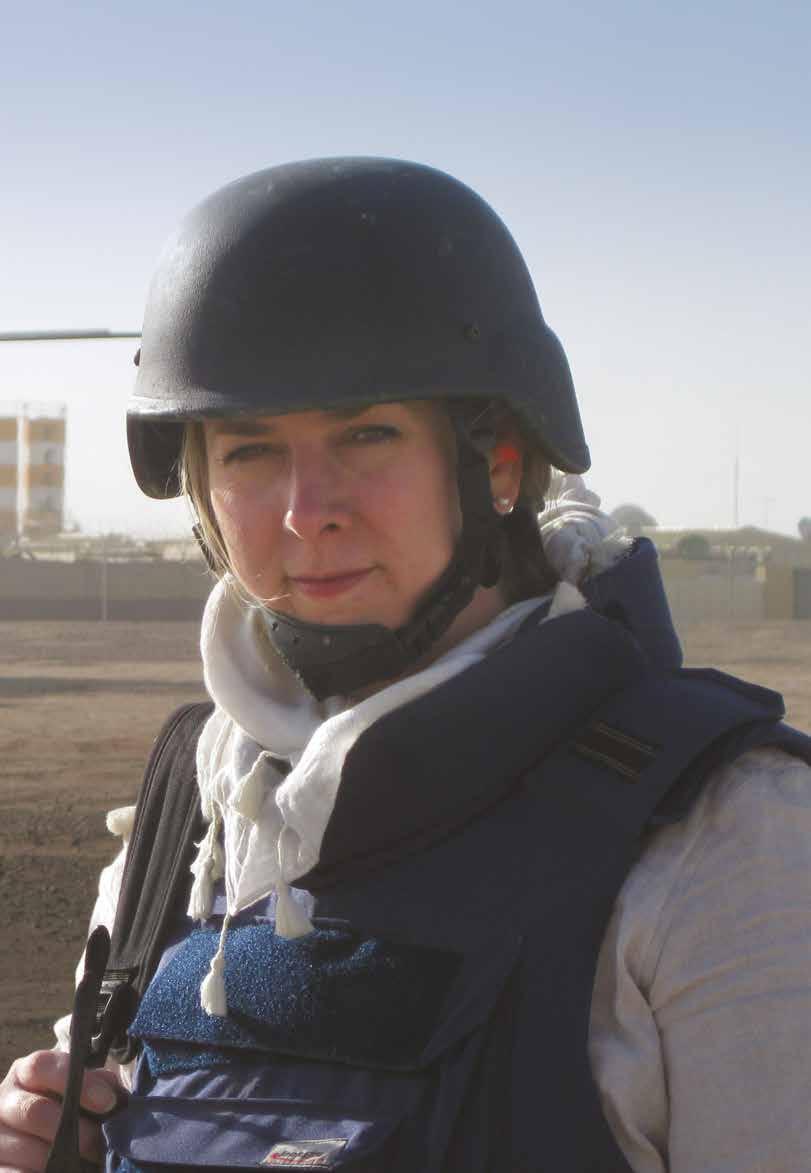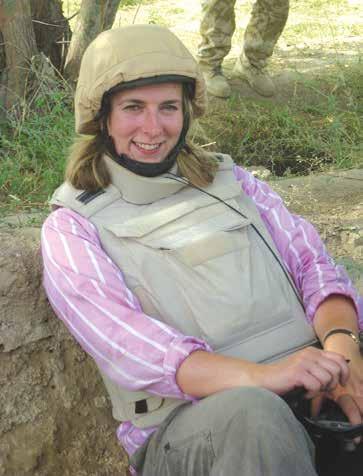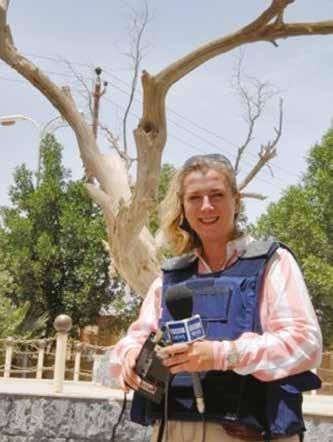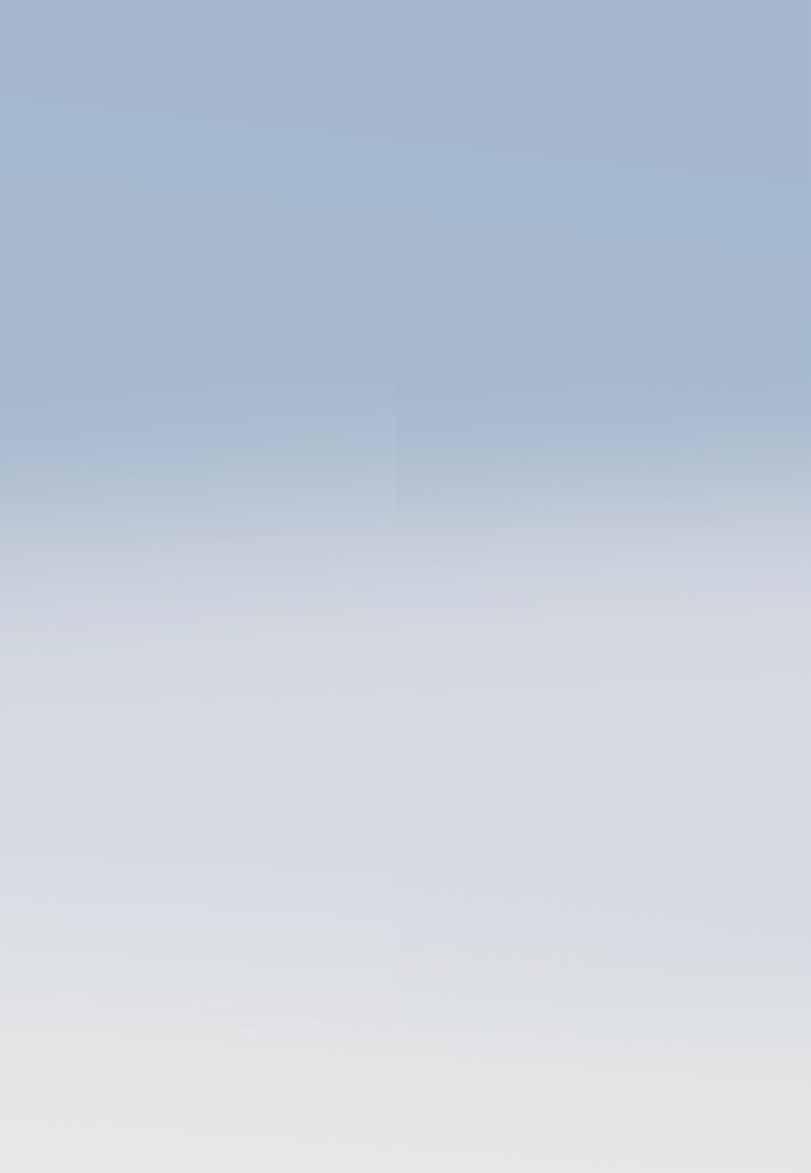
9 minute read
BBC journalist Caroline Wyatt
BATTLING THROUGH
BBC journalist CAROLINE WYATT talks to Emily Bright about how she faced Taliban attacks, an MS diagnosis and a crisis of faith
‘W E almost got blown up twice in one day,’ remembers BBC journalist and former
defence correspondent Caroline Wyatt. ‘We were covering the presidential election in Afghanistan in 2009 and were leaving a pretty dull but important press conference. We took one step out of the Helmand governor’s house and, as we did so, a bomb landed in the garden next door. Thank God there was a really high wall, which stopped the shrapnel from the bomb hitting us.
‘We hit the ground in our flak jackets and helmets. The cameraman turned his camera back on and filmed the aftermath. That was the beginning of election day for us.
‘We were taken to a safe house and watched for two hours as the Taliban shelled the town to stop people going out to vote. We eventually persuaded our security team to allow us to go to a polling station in a lightly armoured vehicle and carry on filming.
‘As we were driving, there was this massive bump and bang. We’d driven
over an improvised explosive device but in 1999 and was embedded with British it hadn’t gone off fully. I gave enormous troops during the Iraq invasion of 2003. thanks. On days like that, I knew there was She became defence correspondent a God who was looking after us. in 2007, and then in 2014 switched to
‘I then spoke to women who were voting religious affairs correspondent, with only a at the polling station, some for the first weekend turnaround between the two jobs. time. It was amazing. Afghan women are When I mention this, I detect a chuckle at resilient and phenomenally brave.’ the end of the phone line as she recalls the
Caroline says such moments of rapid transition, but she adds: ‘It wasn’t as engaging with normal big a change as you yet extraordinary people have been the highlights We’d driven over might think. ‘One of the first of her career. ‘When I was a an improvised stories I covered was what happened with the correspondent in Afghanistan and Iraq, it explosive device Yazidis in northern Iraq, when Isis was taking was a privilege to talk to territory. I was back in the people living there. Sitting down with my flak jacket and helmet. Although my title a farmer’s wife in Helmand and discussing by then was religious affairs correspondent, her hopes and fears has stayed with me the fundamentals of reporting are the same: far longer than talking to any president or go and talk to people affected, find out prime minister.’ what is happening, and don’t be misled by
Some may find such a statement any propaganda, gossip or rumour. Then surprising given Caroline’s CV, which talk to more people to make sure your story spans 30 years at the BBC. She has been stands up and makes sense.’ a foreign correspondent in Berlin after Each answer Caroline gives is delivered reunification, as well as in Bonn, Paris and Moscow. She covered the Kosovo conflict Turn to page 10 ➥
INTERVIEW
BATTLING THROUGH


BATTLING allowed that, and then at the same time, knowing that my faith could offer From page 8 with eloquence and professionalism. She politely navigates my questions, and when I jump to a wrong assumption, she corrects me so gently that I barely notice it, before she propels the conversation forward. comfort. However, when she tells me about ‘It’s like that reporting on how Yazidi women in Iraq were quote: “There are no treated by Isis, her tone changes. The pace atheists in a foxhole.” of her voice slows and she adds emphasis If you come under to each word. fire, even if you’re not ‘That was one of the toughest stories a believer I think you that I’ve ever covered,’ she reflects. ‘What pray, because you happened to the young Yazidi women was need and want that unthinkably horrifying. You didn’t even want help or comfort.’ to believe it. Words fail me on that story; it Caroline says is something that still haunts me.’ that her faith in When Isis invaded the Sinjar mountains both humanity and in 2014, it massacred men, women and God was partially children from the Yazidi religious minority restored through community as they fled their homes. It her other reporting captured younger women and girls, using assignments on them as sex slaves whom they beat, religion. Caroline speaks with Pope Francis imprisoned and raped. ‘A lot of what we Caroline says hearing about those covered in defence horrors challenged the way that she quite often showed the bad side of what Canterbury. ‘Seeing the reception they got perceived her Christian faith. some people describe as faith,’ she says. and the hope that their visits generated was ‘I have never had more arguments with ‘However, covering religious affairs brought pretty awesome,’ she remembers. myself than when I am in war zones over me back to seeing some of its positives ‘Pope Francis is one of the most why God would allow this to happen,’ again. And for that I will be eternally fascinating people I’ve ever met, in that she explains. grateful. he’s incredibly chatty, warm and able to talk ‘And I always came down to: “Well, it’s ‘What struck me the most when I was to anyone. because you have free will to do bad things covering religion was how much people of ‘When you’re part of the Vatican press as well as good.” I came out of war zones faith do for others, such as helping those corps, you travel on the papal plane. The feeling that I couldn’t believe in a God that who are homeless or trapped in modern Pope comes to the back of the plane
Caroline joins a Kandahar patrol (above) and reports from Iraq
slavery.’ to hold a press conference for about While she was 70 journalists, for five minutes at most. religious affairs ‘But I remember one which went on for correspondent, about two hours on the way back from she had the Cuba. I was staggered at his eloquence opportunity to after a gruelling tour when frankly most of travel with the us were exhausted. He was trying to be Pope and the open about his aims, and on things like the



Archbishop of environment especially, where his message

THROUGH


went beyond religion to humanity.’ change my life. I’d wanted to be a foreign presented segments on Radio 4’s From Caroline’s tenure as religious affairs correspondent anyway, so when I went our own Correspondent and anchoring correspondent abruptly came to a close abroad, it just meant that I could order my The World This Week for the World when she was diagnosed with multiple life to suit me better. Service, she now hosts the Saturday sclerosis (MS) in 2015, and she decided to ‘It wasn’t until 2001 that I had another slot on Radio 4’s daily current affairs step down from the role in 2016. really bad phase when I was falling over programme PM. MS is a condition affecting the body’s and feeling dizzy. I had a brain scan and ‘PM is fabulous because the team central nervous system. It can cause I was told that it might be MS, even though that produces it are quite young, and problems with vision, balance, memory I didn’t get a formal diagnosis until 2015.’ they’re bursting with energy and ideas. It and movement. Her relapsing remitting MS has now gives me lots of hope for the future of an Receiving an MS diagnosis took a toll become secondary progressive, the stage industry which is going through a difficult on Caroline’s faith. at which symptoms time. ‘It has been a challenge,’ she Anything journalism gradually worsen. She says that MS has ‘There’s so much that’s wrong information, disinformation or remarks wryly. ‘However, prayer can do to make us changed her life ‘totally, utterly and completely. misunderstandings. People, wittingly or unwittingly, are trying to split society. So brings solace, and through covering less polarised is ‘I can’t walk well any more, and I’m losing the presenting the facts is a vital part of what journalism is doing now. religion, I’ve made a lot of wonderful a good thing use of my right hand very slowly. It’s getting ‘It’s quite often hard to get to the bottom of the story or to understand why friends of different number and number. I things are happening. Certainly on PM, faiths. They understand the challenges of ill know that I have a limited time left where I we try to explain the causes of the stories health or adversity, and have useful ways of can do the kind of work that I’m doing now. and not just say, “Here are the headlines”. seeing and dealing with it. They also have a However, I have never wanted to become I think that anything journalism can do to huge reservoir of compassion.’ bitter or regretful. The more I’ve lost, the explain to people what’s really happening Looking back, she believes that her MS more grateful I am for the things I still have. and make us less polarised has got to be was already manifesting itself well before ‘I would say to anyone who has been a good thing.’ 2015. ‘The symptoms started soon after newly diagnosed: do not despair. There’s Having spent a career on reporting on I joined the BBC, probably in late 1991, lots of help out there. Your life will probably people’s lives around the world, Caroline THROUGH early 1992. I started to get what doctors thought was repetitive strain injury, particularly during night shifts. By the middle of my shifts at three in the morning, I couldn’t feel my hands or my arm. ‘I developed chronic fatigue, and I was feeling exhausted. I decided that I had to change, but not as much as you fear. My enormous hope is that we will find things that really work within the next five to ten years, because the science is progressing.’ These days, Caroline can be found behind a radio microphone rather than in front of a camera. Having previously 18 July 2020 • War Cry • 11 takes a moment to reflect on her own. ‘I am profoundly grateful to have a career that I’ve loved, a fabulous family and wonderful friends,’ she says. ‘Life isn’t all good. Suffering is part of our experience, but one of the most useful lessons of the Christian faith is that you’re not alone.’






